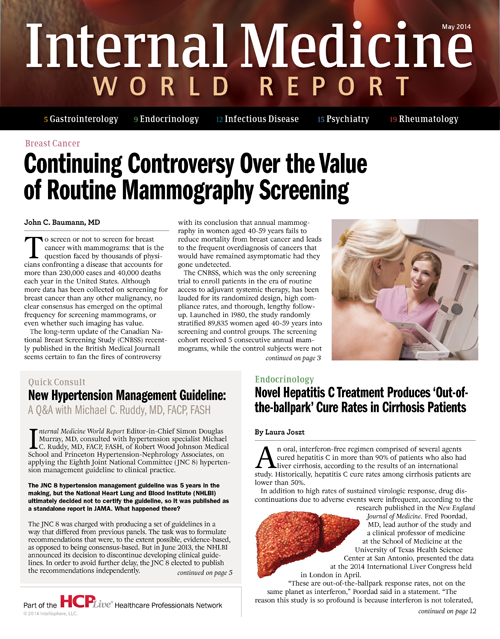Publication
Article
Internal Medicine World Report
Life Expectancy Estimates Help Determine Necessity of Screening Colonoscopies
Author(s):
Since nearly one-quarter of Medicare beneficiaries have limited life expectancies at the time of their colonoscopies, life expectancy should be incorporated into decision-making for preventive services.

Since nearly one-quarter of Medicare beneficiaries have limited life expectancies at the time of their colonoscopies, life expectancy should be incorporated into decision-making for preventive services, according to a study published in Clinical Gastroenterology and Hepatology.
Sahil Mittal, MD, MS, Assistant Professor of Medicine at Baylor College of Medicine in Houston, and colleagues analyzed utilization patterns among 57,597 Medicare beneficiares aged 66 years or older who received at least one screening colonoscopy. According to the researchers, life expectancy is an important factor in considering preventive programs for older patients. While most studies use age cutoffs as an alternate for life expectancy, Mittal’s study estimated life expectancies with a model combining age, sex, and comorbidity.
“Providers find it difficult to integrate age and comorbidities into estimates of life expectancy,” the researchers wrote. “Indeed, physicians receive little exposure in their training to estimating life expectancy.”
Among the Medicare beneficiaries studied, 24.8% had a life expectancy of fewer than 10 years. This is important to note during screening colonoscopy, as it takes more than 10 years for most polyps to form and progress to cancer.
Men were more likely than women to have a limited life expectancy at the time of the screening colonoscopy, though men at any age were more likely to undergo screening colonoscopy. At age 68, the rates of screening colonoscopy were 8.7% and 7.1% for men and women, respectively. At that age, 4% of men and 0.6% of women had limited life expectancy. By age 75, screening rates were 7.6% in men and 5.5% in women. More than one-third of men but just 10.8% of women at this age had a limited life expectancy.
“Prior studies have shown that men are more likely than women to undergo screening colonoscopy,” the researchers wrote. “This finding may reflect the somewhat higher age-adjusted incidence of colorectal cancer in men. Other factors could include physician gender bias in recommending the procedure and greater concerns among women about the procedure. For example, lack of availability of a female colonoscopist may lower acceptance among women.”
Using the sex-specific life expectancy model, the investigators found 74.3% of men and 75.1% of women with life expectancies fewer than 10 years actually died within a decade. The United States Preventive Services Task Force (USPSTF) recommends against routine colorectal cancer screening in patients between the ages of 75 and 84 years and against any screening in patients older than 85. According to Mittal and colleagues’ estimates, 59.5% of patients between the ages of 74 and 85 who received a screening colonoscopy had a life expectancy of fewer than 10 years. Meanwhile, 100% of those aged older than 85 years had a life expectancy of fewer than 10 years.
“There is a need to educate both physicians and the general public about the importance of life expectancy in determining the risk-benefit ratio for preventive screening,” the authors concluded.






